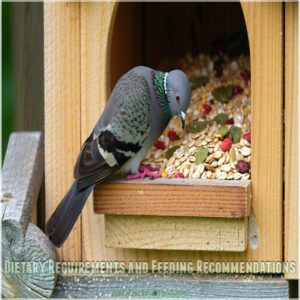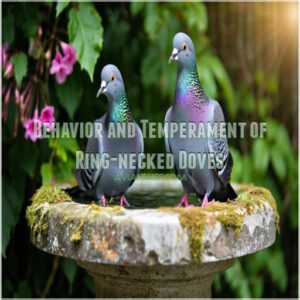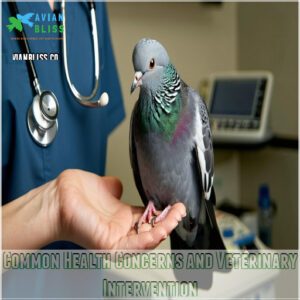This site is supported by our readers. We may earn a commission, at no cost to you, if you purchase through links.

Native to Southern Africa, these adaptable birds thrive in savannas, woodlands, and even urban areas.
They’re gentle, low-maintenance pets, needing a cage that’s at least 24 inches in each dimension, with proper ventilation and perches.
Their diet includes quality seeds, leafy greens, fruits like apples, and supplements like cuttlebone for calcium.
Watch for signs of respiratory issues or parasites, and make sure regular vet check-ups.
With the right care, ringneck doves add a peaceful charm to your home, and are known for their gentle nature and striking reddish-orange eyes, making them a great pet for those who appreciate their curious coos.
Table Of Contents
- Key Takeaways
- Description and Physical Characteristics
- Native Habitat and Adaptability
- Care and Housing Requirements for Ring-necked Doves
- Behavior and Temperament of Ring-necked Doves
- Common Health Concerns and Veterinary Intervention
- Home Care and Concerns for Ring-necked Doves
- Frequently Asked Questions (FAQs)
- What is a ring-necked dove?
- Are ringneck doves a good bird?
- Are ring-necked doves Hardy?
- Are ringneck doves the same as collared doves?
- What is a ringneck dove personality?
- What does a ringneck dove look like?
- Are Ringneck doves rare?
- Do Ringneck doves make good pets?
- What’s the difference between a mourning dove and a ringneck dove?
- Is a ring neck dove a pigeon?
- Conclusion
Key Takeaways
- Provide your ringneck dove with a spacious cage, proper ventilation, and a diet of seeds, leafy greens, fruits, and cuttlebone for calcium.
- Watch for signs of illness like changes in droppings, breathing issues, or unusual behavior, and consult a vet promptly for professional care.
- They have gentle personalities, thrive on interaction but respect personal space, and their calm cooing creates a peaceful atmosphere.
- Ringneck doves are hardy, adaptable pets that need regular cage cleaning, health monitoring, and a balanced diet for long-term well-being.
Description and Physical Characteristics
Ringneck doves charm with their fawn-colored plumage and signature black neck ring.
Their compact bodies measure 9.8 to 10.4 inches, with an impressive wingspan reaching 22 inches.
You’ll notice their reddish-orange eyes, pinkish-red feet, and specialized beak shape, perfect for seeds.
These birds are known for their consistent appearance, with tails that are squared or slightly notched, and their plumage color varies slightly, especially among color mutations like white or peach.
Understanding ringneck dove characteristics helps you spot changes that may signal health concerns.
Native Habitat and Adaptability
Native to Southern Africa, these graceful birds inhabit African Savannas, Woodland Habitats, and Semi Deserts, showcasing their Climate Resilience.
Their adaptation skills help them thrive globally beyond natural ranges.
Here’s how they succeed:
- Use Urban Adaptation to settle in parks or suburban areas.
- Efficient at foraging under diverse environmental requirements.
- Select varied dove habitats, from open grasslands to city landscapes.
- Employ strong ring neck dove nesting behaviour to raise chicks effectively.
Such versatility secures lasting survival wherever they nest.
Care and Housing Requirements for Ring-necked Doves
To keep your ring-necked dove healthy, provide a spacious cage with multiple perches and proper bar spacing. Maintain a clean, draft-free environment with a stable temperature between 65°F and 75°F.
Housing Needs and Cage Requirements
Choosing the right cage for ringneck doves protects their health and happiness. The ringneck dove cage minimum is 24" x 24" x 24", providing enough room for flying and stretching.
Finding the right ringneck dove cage products is important for their well-being. Follow these ringneck dove cage requirements for an ideal setup:
- Use multiple perch types, varying from ½" to 1" wide, to prevent foot problems.
- Opt for bar spacing no wider than ½" for safety.
- Include nesting boxes if breeding.
- Keep a ventilation system for fresh air in a draft-free area.
- Add toys (bells, swings) for enrichment.
- Use easy-to-clean substrates like newspaper.
Maintain hygiene by spot-cleaning daily and deep cleaning weekly.
Dietary Requirements and Feeding Recommendations
A balanced ringneck dove diet keeps your feathered friend healthy and happy.
Start with a quality seed selection, like safflower, millet, and oat groats, to form the base of their meals.
For further ringneck dove care tips, see our detailed guide.
Add variety with fresh fruits (like apples or grapes) and leafy greens for essential nutrients.
Include vitamin supplements, such as cuttlebone, for calcium.
Always provide fresh, clean water to maintain good water quality.
Treats, like split peas, should stay under 10% of their meals for proper nutrient balance.
Behavior and Temperament of Ring-necked Doves
You’ll find that ringneck doves are peaceful, social birds who prefer to spend time alone or in pairs, making a distinctive "kuk-coorrr-u" sound throughout the day.
These gentle pets stay active during mornings and afternoons, showing their friendly nature through soft purring sounds and calm behavior around their owners.
Personality Traits and General Behavior
Through their gentle nature, your ringneck dove will showcase a delightful personality that makes them exceptional companions.
These birds display fascinating social behavior, often expressing themselves through soft, melodious vocalizations throughout their daily activities. Many dove species exhibit unique markings and behaviors.
You’ll notice their calm temperament in how they interact, combining independence with a desire for companionship. While they’re naturally social, they respect personal boundaries and demonstrate remarkable interaction styles with both humans and fellow doves.
Their ringneck dove communication includes gentle cooing and subtle body language, reflecting their peaceful disposition. Despite their reserved nature, they’ll form strong bonds once they trust you.
Nesting Behavior and Breeding Characteristics
Beyond their charming personalities, ringneck doves showcase remarkable breeding behaviors that make them fascinating pets.
These birds form strong monogamous pairs and can nest throughout the year, with females laying 1-2 white eggs per clutch. Ringneck doves have been domesticated for thousands of years.
Your ringneck dove’s nesting journey typically includes:
- Nest building activities, where pairs work together to create platform nests using twigs and soft materials
- A 14-day incubation period, shared equally between both parents
- Careful chick-rearing, including feeding youngsters "crop milk" for about 16 days until fledging
You’ll notice distinctive mating rituals as pairs bond, including gentle cooing and graceful bowing displays. Both parents take turns warming eggs and feeding chicks, demonstrating their exceptional parenting skills in captivity, with a strong focus on monogamous pairs and careful chick-rearing.
Common Health Concerns and Veterinary Intervention
Your ringneck dove can stay healthy with regular check-ups and quick attention to common issues like respiratory problems, parasites, and feather loss.
While these birds are generally hardy, you’ll need to watch for signs of illness such as reduced activity, changes in droppings, or unusual breathing sounds to guarantee prompt veterinary care.
Observations of Health Condition and Symptoms
Your ringneck dove’s health can be tricky to assess since they often hide symptoms.
Regular health checks help spot issues early. Keep an eye out for sudden feather loss around the neck or wings, as this can suggest parasites or illnesses.
Respiratory issues like wheezing or tail bobbing while breathing may signal infections. Avian respiratory ailments can be serious, so consider products for dove respiratory problems.
Watch their droppings—changes in color, texture, or frequency could mean digestive problems or nutrition deficits. Monitor weight monthly, as fluctuations might indicate ringneck dove health problems such as disease or poor diet.
Identifying these ringneck dove symptoms early can prevent serious complications and keep your dove happy and healthy.
Veterinary Interventions and Treatment Options
When you spot signs of illness, trust a qualified vet to handle your dove’s health.
Whether it’s disease diagnosis, medical treatment, or emergency care, professional help matters.
Vets can recommend antibiotics for ringneck doves or antiparasitic options for common issues.
Regular check-ups help detect ringneck dove diseases early, reducing serious risks.
If needed, surgical options or rehabilitation techniques can restore your pet’s health.
Always consult a vet before using over-the-counter meds, even for minor dove health problems.
For example, choosing the wrong antibiotic can complicate recovery.
Professional ringneck dove veterinary care assures your bird gets the safest treatments and preventive plans.
Understanding avian surgery options is important for making informed decisions about your bird’s health, and seeking expert advice is crucial for their well-being.
Home Care and Concerns for Ring-necked Doves
You’ll need to provide a clean, spacious cage and maintain consistent conditions to keep your ring-necked dove healthy.
Regularly check for changes in their droppings and body weight, as these can signal early health issues.
Home Care Tips and Recommendations
Taking care of a ringneck dove requires more than food and water.
You’ll want a cage that’s spacious enough for wing stretching and hopping.
It’s like building a cozy studio apartment—sized for your pet.
For a sick bird, consider creating a comfortable hospital cage.
Cage cleaning is key; freshen water daily, wipe surfaces weekly, and do a deep clean monthly.
Engage their playful side with toys like swings or bells to mimic a natural ringneck dove habitat.
Feather care matters, too—provide shallow bathing dishes so they can preen.
Regular interaction helps reduce noise and builds trust.
Talk softly—doves love familiar voices.
Monitor light cycles; too much may affect health.
A well-planned diet and balanced space make pet dove care enjoyable for both bird and owner.
Monitoring Droppings and Potential Weight Fluctuations
Daily health monitoring keeps your dove happy and safe. Start with Droppings Analysis—fresh droppings should be dark green with white caps. Watch for unusual colors like yellow or black. Consider dove droppings analysis products for detailed health assessments.
Next, practice Weight Tracking. The weight of an average ringneck dove falls between 140-170 grams; sudden loss over 10% signals ringneck dove health problems. Use a small scale weekly, noting Feather Condition and appetite changes.
For Nutrition Balance, check droppings for undigested seeds.
- Consistent droppings color.
- Weekly weigh-ins.
- Appetite changes.
- Stable activity.
- Clear breathing sounds.
Frequently Asked Questions (FAQs)
What is a ring-necked dove?
A gentle dove with soft fawn-colored feathers, a black neck ring, and reddish-orange eyes, it thrives in Africa’s semi-deserts and woodlands.
Domesticated for centuries, it’s known for soothing coos and easy care.
Are ringneck doves a good bird?
Imagine a gentle breeze in a quiet meadow—that’s a ringneck dove.
These birds are calm, easy to care for, and great companions.
With simple needs and a soothing coo, they’re delightful pets!
Are ring-necked doves Hardy?
Yes, ring-necked doves are hardy birds.
They adapt well to various climates, thrive in captivity with proper care, and resist many diseases.
Just provide a draft-free environment, balanced diet, and clean housing for longevity.
Are ringneck doves the same as collared doves?
Ringneck doves and collared doves are different species but look alike.
Ringnecks are smaller with a distinct black neck ring, while collared doves are larger, grayer, and have a partial black "collar" around the neck.
What is a ringneck dove personality?
These doves are social and calm, thriving on interaction but valuing their space.
They’re easygoing, active during the day, and known for cooing.
Their curious, friendly nature makes them lovely companions with gentle, predictable behavior.
What does a ringneck dove look like?
These doves have a fawn-colored body with a sleek black ring around their neck.
Their reddish-orange eyes stand out, while pinkish-red feet add a pop of color.
Compact and plump, they’re gracefully simple.
Are Ringneck doves rare?
Rare but resilient, Ringneck doves aren’t hard to find.
They’re commonly bred as pets and thrive in diverse habitats.
Thanks to their adaptability, they’ve spread worldwide, and you’ll often see them in suburban or rural areas, which makes them quite resilient.
Do Ringneck doves make good pets?
These birds make excellent pets because they’re low-maintenance, gentle, and highly adaptable.
Their soothing coos, simple care needs, and long lifespan make them perfect companions, especially for beginners or those seeking a peaceful, interesting pet experience.
What’s the difference between a mourning dove and a ringneck dove?
Mourning doves are slimmer, with grayish-brown plumage and a pointed tail.
While ringneck doves are plumper, fawn-colored, and sport a black neck ring.
Mourning doves are native to North America; ringnecks originate from Africa.
Is a ring neck dove a pigeon?
Think of the ringneck dove as a cousin to pigeons—they’re both in the bird family Columbidae.
While similar in structure, the dove is smaller, more delicate, and known for its soft coo compared to pigeons.
Conclusion
Picture a ringneck dove cooing softly in its cozy, ventilated cage, feathers sleek and eyes glowing reddish-orange.
These gentle birds thrive with basic care: a varied diet of seeds, greens, and fruits, regular access to cuttlebone, clean housing, and close monitoring for health changes.
Their peaceful nature and adaptability make them ideal pets for attentive owners.
Learn their behaviors, maintain their habitat, and you’ll enjoy a healthy, happy ringneck dove bringing calm to your home, with the understanding that providing the right environment is key to their happy existence.









